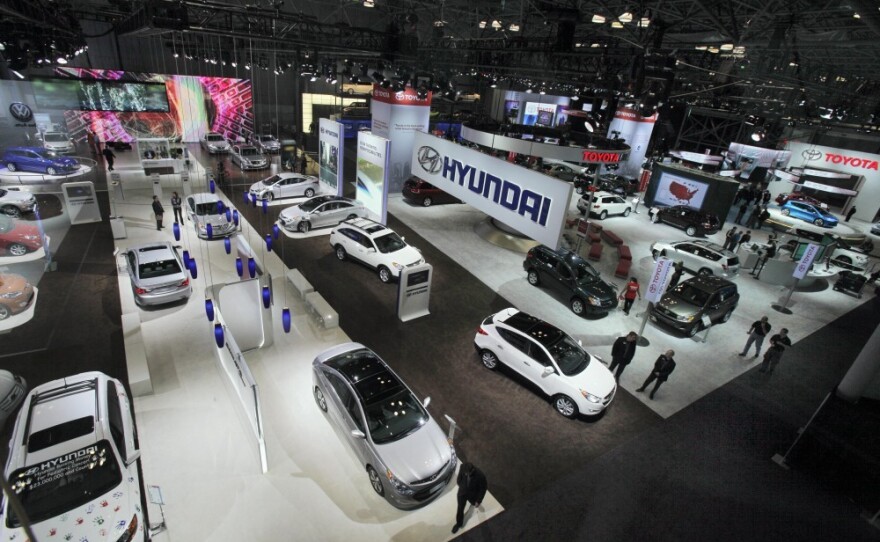Auto shows are usually just really big industry parties — a time for car executives to show off their cool new stuff, tease their rivals, put on a new face for the public. The New York International Auto Show had all of that Friday, but it also had a little more: a touch of melancholy.
"During these challenging times, we have received warm encouragement and tremendous support from many in the United States," said Takeshi Tachimori, the new chairman of Subaru of America.
Though special attention was paid to the Japanese automakers as they recover from last month's earthquake and tsunami, that note of somberness and gratitude was about as far as the executives would go.
The rest of the show and the product launches were full of the typical sort of weird hyped-up auto show exuberance — like Jack Hollis, vice president of Scion, unveiling its new sport concept car: "You know I get excitable about a lot of things, but I LOVE this car."
Beside the strange mix of happy and sad, when pressed about the realities of the situation in Japan, executives were polite but deflective.
"It's affecting the entire industry," said Bob Carter, head of Toyota North America. "There will not be an automotive brand that remains unaffected by this tragedy."
We're very concerned that the production disruption that we've seen from the suppliers in Japan is going to be more serious than the Japanese automakers are letting on.
That is true. It's also true the earthquake and tsunami have had a greater effect on the Japanese car companies. Toyota announced Friday that it won't get back to full production in the U.S. until this summer. Globally, it won't get back on track until winter.
Despite the setbacks, Carter and all the other executives of Japanese companies took great pains to remain upbeat.
"We remain focused on bringing the best product to market, at a great value for American consumers, at a high mpg for American consumers. That has been the heritage of Toyota and you'll see us continue to do that," Carter said.
Some of the Toyota problems may have shown the Japanese automakers the importance of skillful PR.
"They've been facing some very interesting issues that they've never faced before," said Aaron Bragman, an analyst with IHS Automotive. Bragman says the Japanese car industry hasn't had much experience dealing with PR nightmares like, say, its Detroit brethren. That's affected how the carmakers have responded to this disaster.
"We're very concerned that the production disruption that we've seen from the suppliers in Japan is going to be more serious than the Japanese automakers are letting on," he said.
He says there's one reason the car companies are putting on as happy a face as possible: stock price.
"You don't want to alarm any investors; you don't want to alarm the market," he said. "If the market thinks that you're not going to have the same kind of strong earnings this year that you're claiming that you're going to have, it could adversely affect your stock price."

Bragman says he doesn't expect the Japanese automakers to be completely forthright about conditions until it's absolutely necessary. The reality is, he says, the supply chain problems couldn't come at a worse time.
"We're just about to go into the hottest selling months of the year — spring and summer — and this is combined with the fact that we have high fuel prices," he said. "The vehicles that are going to be in demand are the smaller vehicles, which are typically the strongest for the Japanese."
So who benefits if the Japanese carmakers aren't able to get their cars to market?
The Korean automakers Hyundai and Kia had been snapping at the heels of the Japanese automakers long before the recent disaster.
"We are, thankfully, relatively unaffected by the component shortages resulting from Japan or its parts, because we don't have many of them," said Dave Zuchowski, executive vice president for sales for Hyundai Motor America. "So that's really not affecting our availability."
Zuchowski and his company are careful not say or even suggest that they'll benefit if the Japanese carmarkers stumble, but Zuchowski did say Hyundai had the best lineup of cars positioned for escalating fuel prices.
"From a freshness of product and a positioning of product, we're in great shape," he said.
The harsh reality is there is a pent-up demand in the U.S. for cars. With gas prices climbing higher and higher, the company with the most fuel-efficient vehicles on dealer lots is likely to win — at least this round.
Copyright 2022 NPR. To see more, visit https://www.npr.org. 9(MDAzMjM2NDYzMDEyMzc1Njk5NjAxNzY3OQ001))







